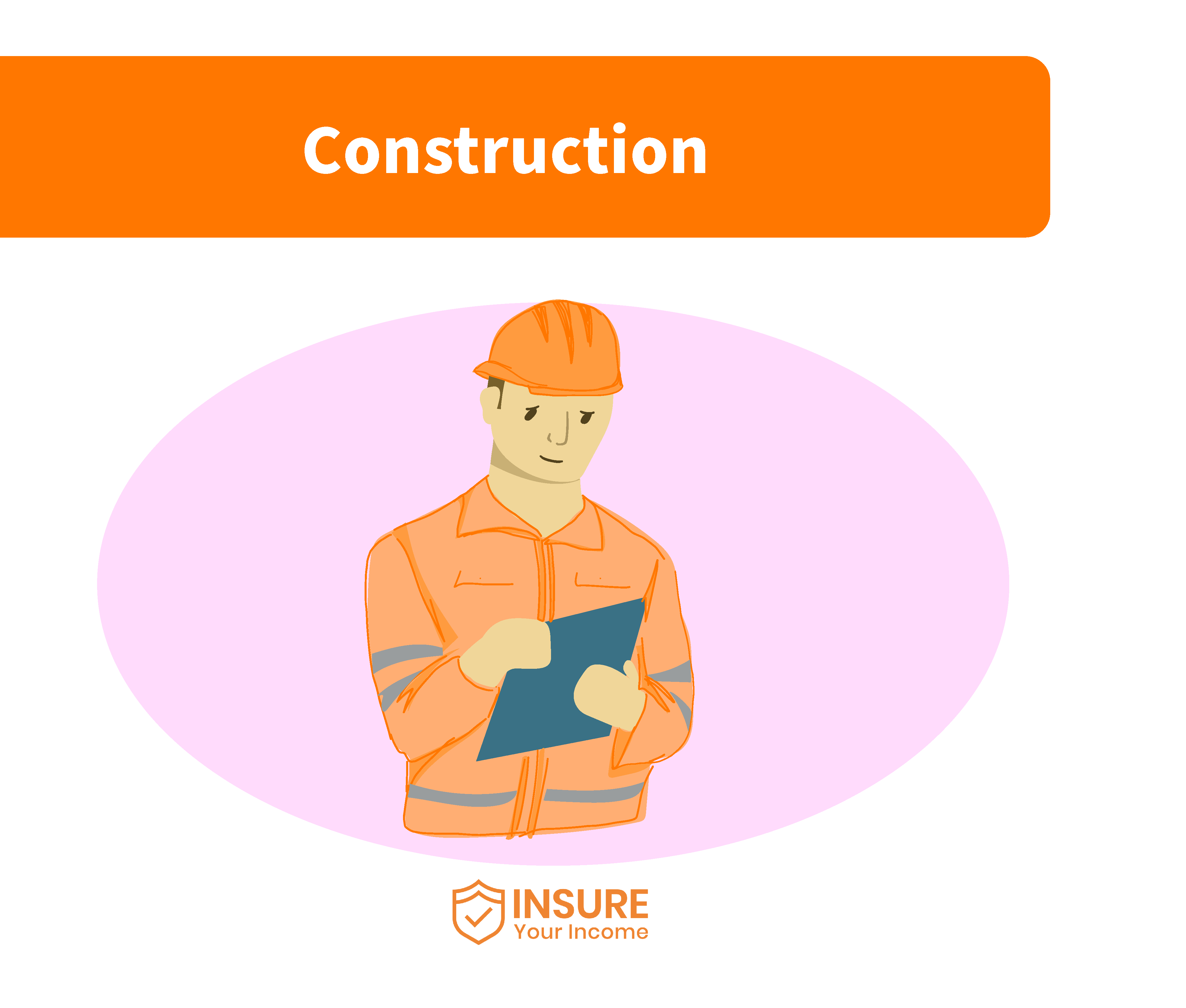Income insurance protects your income if you unexpectedly can’t work due to injury or illness.
It’s an easy way to help protect your financial future, and ensure your lifestyle and family are protected in any event.

Can an Asbestos Worker get income protection insurance?
Asbestos exposure is proven to put your health at risk of cancer and many other serious illnesses, many of which lead to death. Asbestos is recognized as a serious health hazard and its use is highly regulated, there is no safe level of exposure to asbestos for any worker.
An asbestos worker is an extremely high-risk job and therefore does not qualify for any income protection.
Status: declined- uninsurable
Can a Building Contractor get income protection insurance?
Building Contractors are needed to plan and coordinate construction activities. There are a number of hazards building contractors face on a day-to-day basis, especially when they are involved in manual work. Contractors often carry out their work on building sites where they face hazards that could result in a slip, trip, or fall accident. Due to such hazards, building contractors can qualify for third-class income insurance.
Status: Moderate risk- insurable
Can a Building Contractor (no manual work) get income protection insurance?
Building contractors who do not participate in manual work face few risks in the workplace. In general, their work takes place within an office or regulated space. Due to the low risk involved in the occupation, building contractors who do not perform manual work can receive first-class income protection.
Status: Low risk- insurable
Can a Building Inspector (no manual work) get income protection insurance?
Building inspectors who are not involved in manual work ensure building structures are safe and regulated. Generally speaking, building inspectors work in safe conditions and wear appropriate safety gear. For these reasons, building inspectors can qualify for first-class income insurance.
Status: low risk- insurable
Can a Building Inspector get income protection insurance?
Building inspectors, whether involved in manual work or not, are needed to ensure building structures are safe and regulated. Generally speaking, building inspectors work in safe conditions and wear appropriate safety gear. For these reasons, building inspectors can qualify for first-class income insurance.
Status: Low risk- insurable
Can a Building Surveyor get income protection insurance?
Building surveyors assess and grade builds to ensure they meet safety and quality standards. While building surveyors make regular site visits, their job is oftentimes office-based. Building surveying is deemed a safe job, with little risk of injury or adverse health effects. For these reasons, building surveyors qualify for first-class income protection.
Status: Low risk- insurable
Can a Chargehand get income protection insurance?
A chargehand is exposed to a high level of risk. Chargehands are often exposed to electrical hazards and livewires, manual handling of heavy work materials, and the risk of falling objects and slip, trip, and fall accidents on building sites. Accounting for such risks, chargehands qualify for fourth-class income protection insurance.
Status: High risk- insurable
Can a Crane Driver get income protection insurance?
Crane drivers operate at a high level of risk. Crane drivers can suffer a fall from a height, electric shocks, and injuries from falling objects from the crane. Crane drivers are also at risk of crashing the crane leading to serious and even fatal injuries. Considering such risks, crane drivers do not qualify for income protection insurance.
Status: Declined- uninsurable
Can a Crane Erector get income protection insurance?
Crane erectors are exposed to a high level of risk while assembling and testing cranes. Crane erectors can injure themselves from a fall from a height, manual handling of heavy equipment, and electrical fires and shocks. Considering the high level of risk involved in the occupation, crane erectors do not qualify for income protection insurance.
Status: declined- uninsurable
Can a Demolition Worker get income protection insurance?
Demolition workers are exposed to a high level of risk. Demolition workers can face injury from flying objects, operating dangerous tools such as sledgehammers and bulldozers, falls from a height, loud noises, and collapse of working structures. Considering such high risks, demolition workers do not qualify for income protection insurance.
Status: declined- uninsurable
Can a Digger Driver get income protection insurance?
Digger drivers face a number of occupational risks at work. Digger drivers can experience a crash when driving their diggers, leading to injuries. Diggers may also topple over if there is a weight imbalance and drivers can be crushed by the machine or fall from the machine and suffer an injury. Considering such high risks, digger drivers do not qualify for income protection insurance.
Status: declined- uninsurable
Can a Drill Operator get income protection insurance?
Drill operators come into contact with a high level of risk at work. Drill operators can suffer injury from misuse of a drill. They are also at higher risk of breathing problems, sight issues, and skin inflammation from working with dust and debris. Ergonomic risks such as working in uncomfortable positions can cause long-term illnesses. To account for these risks, drill operators qualify for fourth-class income protection insurance.
Status: High risk- insurable
Can an Electrician (in the construction industry) get income protection insurance?
Electricians in the construction industry are exposed to a high level of occupational risk. Electricians face the risk of injuries from electric shocks and fires, falls from a height, and a number of ergonomic risks, working in uncomfortable positions and small spaces. Accounting for these risks, electricians qualify for fourth-class income protection insurance.
Status: High risk- insurable
Can an Electrician (construction industry and working at heights less than 50ft) get income protection insurance?
Electricians in the construction industry who do not work at extreme heights face less risk than those who operate on structures higher than 50 feet. They are still at risk of electrical shocks and fires, and ergonomic risks but are exposed to less risk in terms of fatal fall accidents. Accounting for these risks, electricians working at heights less than 50ft qualify for third-class income protection insurance.
Status: moderate risk- insurable
Can an Escalator Erector get income protection insurance?
Escalator erectors are exposed to a high number of risks at work. Escalator erectors often work at a height, putting them at risk of a serious fall accident. Manual handling is also a major risk for escalator erectors who can suffer major injuries from carrying heavy equipment and tools. Escalator erectors often work with dangerous tools including power tools, saws, and electrical equipment, putting them at risk of electrical shock and fires. Given the level of risk involved, escalator erectors qualify for fourth-class income protection insurance.
Status: high risk- insurable
Can an Excavator get income protection insurance?
Excavators face a high level of risk at work. Excavators can suffer a fall into a pit or dug-out area, which can lead to severe injury. Excavators may also crash their vehicles or suffer injuries from electrocution. Considering these risks, excavators cannot avail of income protection insurance
Status: declined- uninsurable
Can a Floor Layer get income protection insurance?
Floor layers experience a high level of occupational risk. Floor layers are exposed to ergonomic risks such as working in uncomfortable positions for a prolonged time period, resulting in musculoskeletal disorders. Floor layers are also at risk of injury from manual handling and accidents involving power tools. Accounting for these risks, floor layers qualify for fourth-class income protection insurance.
Status: High risk- insurable
Can Floor Tiler get income protection insurance?
Floor tilers experience a number of risks at work. Floor tilers can injure themselves from tools like electrical cutters. They can also incur injury from manual handling of tiles and cement and also face the risk of inhalation of dust particles from cement. Accounting for these health and safety risks, floor tilers qualify for fourth-class income protection insurance.
Status: High risk- insurable
Can a Foreperson (no manual work) get income protection insurance?
A foreperson who does not engage in manual work carries out supervision and managerial tasks, that are generally safe in nature. However, a foreperson may still operate in workplaces that can be dangerous, like construction sites, where accidents are more frequent. To account fir this level of risk, a foreperson who does not engage in manual work qualifies for second-class income protection insurance.
Status: mild risk- insurable
Can a Foreperson (some manual work) get income protection insurance?
A foreperson who engages in some manual work may find themselves exposed to a higher level of occupational risk. Engaging in manual work such as manual handling can lead to injuries and working in an area where accidents are more common heightens safety concerns. Accounting for such risks, a foreperson who engages in manual work can qualify for third-class income protection insurance.
Status: moderate risk- insurable
Can a Fork Lift Truck Driver get income protection insurance?
Fork lift truck divers are exposed to a high level of occupational risk. Driving a forklift presents risks of accidents like being struck by another moving vehicle, crashing the forklift, or falling from a height. Considering the high level of risk involved in the occupation, lift truck drivers do not qualify for any form of income protection insurance.
Status: declined- uninsurable
Can a JCB Driver get income protection insurance?
JCB drivers operate at a high level of risk. JCB drivers can get into crashes, leading to serious and even fatal injuries. JCB drivers can also be crushed by earth materials, as well as being exposed to manual handling and general construction site risks. Given this high level of risk, JCB drivers do not qualify for income protection insurance.
Status: declined- uninsurable
Can a Labourer (no farm work) get income protection insurance?
Labourers carry out a vast field of tasks and can be exposed to a number of risks at work. Working on a construction site opens up the potential for occupational risks such as falling from a height, injuries from power tools, and falling objects. Labourers are also at risk of lung problems from dust inhalation and a number of ergonomic risks. Considering such risks, labourers do not qualify for income protection insurance.
Status: declined- uninsurable
Can a Miner get income protection insurance?
Miners are exposed to a high level of occupational risk. Dust inhalation is a major risk for miners as it can lead to respiratory issues. Miners are also at risk of hearing damage from loud noise, musculoskeletal disorders, sight loss and digestive problems from ‘Whole Body Vibration’, and a number of ergonomic risks from working in uncomfortable and poorly lit areas. Considering such risks, miners do not qualify for income protection insurance.
Status: declined- uninsurable
Can a Pipe Lagger get income protection insurance?
Pipe laggers can come into contact with dangerous substances like asbestos and lead, which can prove extremely dangerous. Pipe laggers can suffer burns from hot water and pipes and a number of injuries from power tools. Pipe laggers are also exposed to a number of ergonomic risks, working generally in crouched positions for long periods of time. Considering such a high-risk level, pipe laggers do not qualify for income protection insurance.
Status: declined- uninsurable
Can a Pipe Layer get income protection insurance?
Pipelayers are exposed to a high-risk level. Pipelayers often work at a height, exposing them to the risk of a fall from a height. Pipelayers are also at risk of musculoskeletal injuries from manual handling of heavy piping and tools, inhalation of dust particles and metal fragments which can lead to respiratory problems, and exposure to hazardous materials, such as refrigerants, oxidizers, and flammable products. Given the high level of risk involved in the job, pipe fitters do not qualify for income protection insurance.
Status: declined- uninsurable
Can a Quantity Surveyor get income protection insurance?
Quantity surveyors are primarily sedentary workers, planning and costing construction projects, in an office space. Considering the low-risk level involved in the job, quantity surveyors qualify for first-class income protection insurance.
Status: Low risk- insurable
Can a Quarry Worker get income protection insurance?
Quarry sites are frequently noisy and dusty, and much of the labour is strenuous. Quarry workers may be more vulnerable to hearing loss, lung issues, and musculoskeletal ailments such as back damage as a result of these variables. Considering such extreme risks, quarry workers cannot qualify for income protection insurance.
Status: declined- uninsurable
Can a Rigger get income protection insurance?
Riggers are at risk of musculoskeletal diseases from the manual handling of heavy materials and equipment. Riggers are also at risk of a fall from a height while working on temporary structures and scaffolding. As well as this, riggers may operate dangerous machinery which can lead to a crash accident. As the health and safety risks for riggers are so severe, those in the occupation cannot avail of income protection insurance.
Status: declined- uninsurable
Can a Road Constructor get income protection insurance?
Road constructors work with a large number of dangerous equipment, like road roller machines and forklift trucks, which can lead to accidents like crashes. Road constructors may also take part in the manual handling of heavy work materials, leading to musculoskeletal injuries and chronic pain. Since the risk level involved in road construction is so high, those in the occupation do not qualify for income protection insurance.
Status: declined- uninsurable
Can a Road Worker get income protection insurance?
Road workers are at risk of traffic accidents, heat stress, hearing damage from exposure to loud noises, risks from manual handling, and respiratory diseases from dust inhalation. Given the high level of risk involved in the job, road workers do not qualify for income protection insurance.
Status: declined- uninsurable
Can a Sewage Works Attendant get income protection insurance?
Sewage works attendants are exposed to a high level of occupational risk. Working with or near sewage presents the risk of skin infections, hepatitis, gastroenteritis, and a number of other serious health issues. Sewage works attendants are also at risk of injury from manual handling and operating dangerous tools. Considering such risks, sewage works attendants do not qualify for income protection insurance.
Status: declined- uninsurable
Can a Signal Person get income protection insurance?
A signal person operates at a mild level of risk, helping and directing crane drivers. However, working on construction sites means they are exposed to a number of risks like falling objects, slips, trips, and falls, and structural collapse. To account for this level of risk, a signal person qualifies for second-class income protection insurance.
Status: mild risk- insurable
Can a Shop Fitter get income protection insurance?
Shopfitters operate at a high level of risk, working with power tools, handling heavy materials, and often becoming exposed to harmful materials like asbestos and lead. To account for these risks, shop fitters qualify for fourth-class income protection insurance.
Status: High risk- insurable
Can a Steel Constructor get income protection insurance?
Steel construction is a high-risk occupation. Steel constructors often work with fire and intense heat to melt and shape steel, which can cause accidents and injuries. Steel constructors also work with a number of dangerous power tools, and engage in manual handling of heavy equipment. Considering the high level of risk involved in the occupation, steel constructors do not qualify for income protection insurance.
Status: declined- uninsurable
Can a Steel Erector get income protection insurance?
Steel erectors work at a high level of risk. Steel erectors face the risk of a fall from a height and often work on temporary structures and scaffolding which can collapse. Steel erectors also engage in manual handling and work with a number of dangerous tools that can cause injury. Considering these risks, steel erectors do not qualify for income protection insurance.
Status: declined- uninsurable
Can a Structural Engineer (no manual work) get income protection insurance?
Structural engineers who do not engage in manual work are generally sedentary workers, operating within an office space to develop plans. Structural engineers are exposed to minimal health and safety risks and therefore qualify for first-class income protection insurance.
Status: low risk- insurable
Can a Tarmac Layer get income protection insurance?
Handling hot tarmac can lead to burns and other severe injuries. Digging on roadsides and manual handling of working materials can cause musculoskeletal diseases. Tarmac layers may also incur injuries from a traffic accident. Given the high level of risk involved in the occupation, tarmac layers do not qualify for income protection insurance.
Status: declined- uninsurable
Can a Tunneller get income protection insurance?
Tunnelers are at risk of a number of injuries working in an underground space if it is not well ventilated, causing them respiratory issues. Tunnelers may suffer injuries from manual handling and operating machinery and tools. Considering the dangers to health and safety involved in the job, tunnellers do not qualify for income protection insurance.
Status: declined- uninsurable




